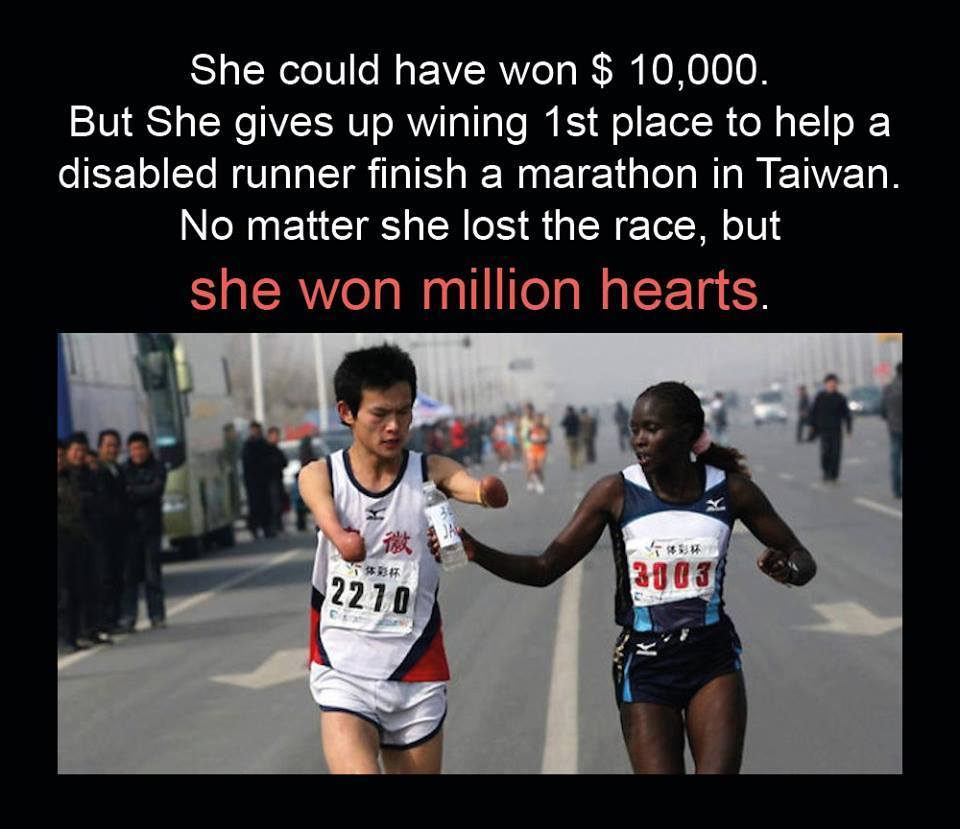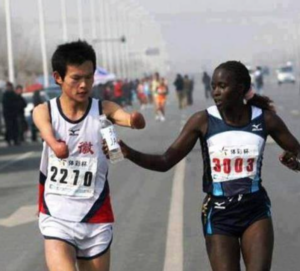Two Types of Able-Bodied Runners Make The News – Jacqueline Nyetipei Kiplimo and the Heart of a True Winner
Jacqueline Nyetipei Kiplimo She restored faith in humanity. heart emoticon #Respect
Jacqueline Nyetipei Kiplimo is a female marathon athlete from Kenya. She was born in 1984. In March 2010, she participated in the Zheng Khai International marathon (42.5 miles), in China. The competition attracted more than 1,500 athletes, including 200 foreigners from over 26 countries. During this event, the world was surprised by how Jacqueline helped a disabled athlete from china, up sacrificing his victory!
The Mature Runner
By David Summerfield
The following two stories have to do with runners depicted as “disabled” or “challenged” in one way or another. Ha! These runners are hardly; their training makes them head-and-shoulders above us more normal runners.
First, there’s Makenna Myler, an Asics sponsored runner, who has been paving the way for women to keep running all through their pregnancies. I will relay the facts as I have found them, and let you make your own conclusions! I found the article at “yahoo!life,” written by Korin Miller. The title caught my eye: “Don’t be afraid to challenge reality.” Makenna ran a 5:17 mile while 9 months pregnant (a few weeks before her due date). Here is the picture that came with the article.
Nine months pregnant, no problem – photo courtesy of Makenna Myler herself.
As a professional runner, Makenna ran the 10,000 meters at the 2020 Olympic Trials in Eugene, OR, and came in 14th. Her PR is 32:03 at that distance. She also has a 4:42.40 mile to her credit (as well as a 15:31 5km PR). She decided in 2020 to run a mile within a week of her due date. It turns out she loves running timed miles on the track to celebrate important events – like running a mile on her wedding day (she would become a “Myler” – her husband’s last name – so it seemed appropriate!). She had the blessing of her obstetrician, and kept training right up until the delivery. She had a bet with her husband, who said she couldn’t run a sub-8 minute mile under those conditions. So, she ran a 5:25 on a $100 bet. Then, three years later, and being 3 weeks before the due date (this time it was February 21st – and due on March 15th), she ran a 5:17 mile! I found a Runner’s World interview written on March 13th, by Kells McPhillips (and taken from an NPR interview) with these quotes from Makenna: “It’s kind of funny. The weight almost just catches up to you in a sense. Like, all of a sudden, it hits your body that, like, you’re carrying this much weight. You need to slow down, even though you can kind of start out at a similar cadence.”
She added that while her midsection wasn’t shaking too much, her hips, quads, and lower back had to work overtime to propel her from one step to the next. She knew from her first timed mile (the 5:25 in 2020 before her first birth) she would get a lot of criticism for doing this; being irresponsible, endangering the life of a newborn, etc.
“There’s so many people who think I’m an absolute idiot,” she said. “And this time around, it’s just been quite a laugh with what people have to say. The comments are just absolutely ridiculous. The best is, ‘if men could run while pregnant, they would be running a four-minute mile, so this isn’t impressive.’”
And this leads me into one more story for April where an elite marathon runner saw a handicapped runner fumble trying to get a drink at the 10km table and helped him hydrate, and then ran with him 28 more kilometers, to make sure he had the water he needed. The report I read stated that Jacqueline Nyetipei Kiplimo ran beside the unknown Chinese runner for 28km, and left him with 5km to go. She raced ahead trying to catch the front pack, which she did! The Chinese runner was listed as an elite runner, but in the “disabled” category.
Jacqueline Nyetipei Kiplimo races alongside a Chinese runner and helps him along the course. (Photo from Skeptics.StackExchange.com)
Doing a little research, I found out that the Kenyan runner (Kiplimo) actually did finish this race in 2nd place, earning $6,000. The winner took home $15,000. They were 68 seconds apart at the finish (winner Chepkemoi, also a Kenyan, came in at 2:36:54). This all took place at the International Zheng-Kai Marathon in China on March 28th, 2010. There was some controversy with the veracity of the news article, but apparently it was thoroughly researched and everything checked out fine.
According to the story, Kiplimo came upon the “disabled” Chinese runner at a water stop and noticed he was having trouble handling the water cup. So, Kiplimo helped him out, and they ran side-by-side until the 38km mark, at which Kiplimo put on the afterburners, and caught back-up to the women’s front pack, almost pulling off the win. Of course there’s a lot of online comments about this incident, but the picture above is all I need.
These two articles inspired me to not take anyone’s (especially my) apparent difficulties in running as normal and then do something about it, like change the reality one is looking at. I would never call myself a “disabled” runner, though I often feel like one. Looking at the Chinese runner holding down somewhere around a 2:40 marathon pace, he certainly wasn’t laboring under any reality that said he shouldn’t be there in an “elite” category.
Hmmm, that gives me an idea; why not create my own category; I’m in the “Over 75 Beartooth Foothills Super Category.” So what if the vast majority of those I pass on the trails are all deer? Yes, they look a bit askance at me, and often scatter as I approach, but mainly they just stand there and stare. They must know they’re witnessing a miracle happening, right in front of their eyes!
These are my spectator deer, witnessing the miracle of my accomplishments! source
Jacqueline Nyetipei Kiplimo demonstrates what really matters in life and in sports
The marathon is one of the most difficult races in track and field, at a little over 42 kilometers (26.2 miles).
Most marathoners will tell you their bodies hold up for the first 30 kilometers; the last 10 kilometers are all mental toughness. To be a world-class marathoner, you must run that distance in 2 1/2 hours. But for some, achieving a marathon finish is a lifelong dream.
Jacqueline Nyetipei Kiplimo’s dream of being a world-class runner began when she was a child in Kenya. She soon realized she had the talent and the willpower to compete. She also knew she would have to train full time, which meant not being able to work to help support her family. But she was confident that she could bring home prize money.
Jacqueline noticed the man and immediately knew that he needed help. She grabbed a water bottle and helped him get the fluid his body needed to complete the race. Then she ran at his pace with the bottle and helped him sip while they strode along.
Runner after runner passed Jacqueline. Her hopes of winning were getting lost in the melee of runners ahead of her. With only 4 kilometers left in the race, and certain that her new friend would now finish, Jacqueline picked up her pace. Her long stride kicked in, and she weaved through the fading competitors to finish second.
That day, Jacqueline missed out on first place, but she finished with something more important: her humanity. When asked about the bigger cash prize, she said that money isn’t everything. She returned home with the smaller prize of second place, but to her seven younger siblings, she brought home something much more valuable to them: the right example.
The Foundation for a Better Life promotes positive values to live by and pass along to others. Go to PassItOn.com.




